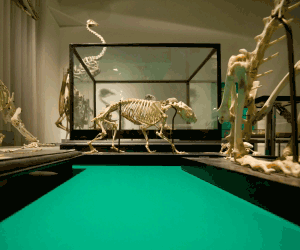Museum Exhibit Designers and Consultant Jobs
You can get the satisfaction of doing museum work without working for a museum! Museums hire outside companies to provide a variety of services for them.
Working for one of these gets you into the museum field even if you’re not into one museum.
Architects design museums and renovations for museums. Some firms specialize in museums or even in some types of museums. Designing a museum is fundamentally different from designing most other structures, so there is industry-specific knowledge that is required. Find an architect who has contracts or is bidding on contracts for museum work.
Other groups that are involved in the front end of building or expanding a museum are the designers and providers of wide-screen movie systems, planetarium, and point of sale devices. Sales personnel travel the country searching for museums that might need the services of their company. Once a contract is signed, other company people get to work making the component parts, designing how it will work, or training museum staff how to operate it.
Museums use all types of consultants. Some advise museums on public relations and marketing. Others on membership sales and development (fund raising).
 Exhibits on Display
Exhibits on Display
Capital campaign consultant work for months at a time to help museums identify who or what organization will give money for the next expansion of a museum.
Some consultants are more specialized and recommend sound systems, computer hardware, or acoustic exhibit guides.
To improve sales at museum stores, consultants recommend new store layouts, fixtures, and product lines. Security consultants recommend upgrades for specific high value exhibits or for long-term improvement.
Museums usually have in-house exhibit designers, but for very large jobs the small museum staff can’t do all the work. If the museum is expanding into a new building, they will likely job out the design work to one or more companies. Also exhibit design firms create traveling exhibits to rent to museums for a profit. This is a huge business in the US and a fast growing business elsewhere. Designing exhibits requires good knowledge of industry practices (some are available on blogs or in publications) and experience.
Designing exhibits is different from building them. Some companies do both; some do one or the other. Building exhibits requires a wide range of skills: carpentry, electronics, mechanical systems, sound, lighting, computers, video, and graphics. No, you don’t need to know them all, but you need good qualifications in one or more. If you have a shop in your garage and can make exhibits or parts of exhibits, make sure museums know about your skills and prices. A portfolio helps sell yourself.
Program providers offer museums cost effective flexibility and greater diversity of programming for the public and museum members. A museum can pay you to deliver a class, workshop, or museum camp program on a pay per hour base that is much more economical for them than hiring someone full time. Find out what programs the museum offers and approach the education director with some suggested topics. For any that interest the director, supply your credentials and a program outline. Point out that the museum can afford to pay you well for the contact hours since they won’t pay you when you’re not giving a class. The museum gets more and better programming for fewer dollars – everyone wins.
Museum associations have paid staff. There are several benefits to working at an association. One is that the offices are closed on holidays, whereas most museums are open. Another is that you hear of any great job openings before the rest of field does. You work with museum professionals without dealing with the public.
More archivists, curators, and conservators work outside museums than in. Less than 40% work in museums. Local, state, and federal governments employ almost as many. The National Archives and Records Administration and the Department of Defense are two of the larger federal employers. The Department of the Interior employs many, too.
Outside of governments, corporations use people with these skills. Some corporations operate in-house collections of materials for and about their corporation or have their own art collections hanging on the oak-paneled walls of company headquarters. A few wealthy individuals engage archivists, curators, and conservators to help them manage their private collections.


 Teach English in Asia
Teach English in Asia  Cruise Ship Jobs
Cruise Ship Jobs  Alaska Fishing Industry Jobs
Alaska Fishing Industry Jobs  Sharing Economy / Gig Economy
Sharing Economy / Gig Economy